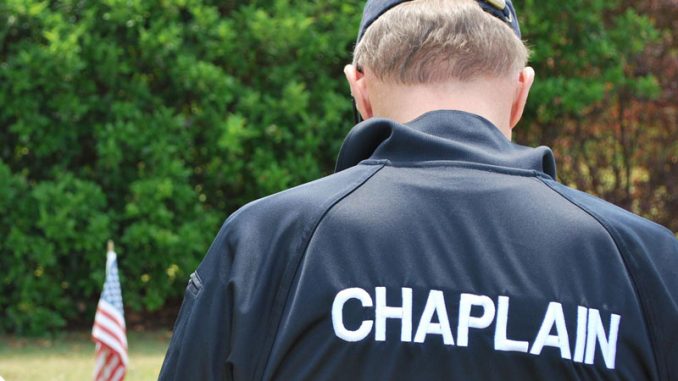
CHAPIN—Deacon Greg Weigold has launched an effort to draw people into a statewide ministry that he has been a part of in the Columbia area for the past six years.
Deacon Weigold, from Our Lady of the Lake parish, met Deacon Ron Anderson at what is now the Basilica of St. Peter and was first introduced to the chaplaincy program. Deacon Anderson is currently a chaplain at the Richland County Sheriff’s Office.
“He kind of talked me into it,” Deacon Weigold said, noting that he also received a nudge from the late Msgr. Joseph Roth.
Msgr. Roth, who passed away in 2011, was a chaplain and volunteer firefighter with the Sullivan’s Island Fire Department in the early 1990s. He was the first Catholic priest to become chaplain of the South Carolina Firemen’s Association and the Fire Chief’s Association, and in 2007 was named the first Catholic priest to the state Firefighters’ Hall of Fame.
“He was the state fire chaplain for a long time and whenever I saw him, I would say to myself, ‘I could do something like that’,” Deacon Weigold said. “He first put the idea in the back of my mind.”
Deacon Weigold has a long history of public service, including 14 years in law enforcement in New Jersey, four years in firefighting, and four years in civil air patrol in S.C.
He learned early in his chaplaincy that the program in South Carolina is “kind of a closed community … I had to kind of dig around, call, email, kind of keep at it.”
Finally, he contacted the Chapin Police Department. Working with the police chief, the two put together a manual for the chaplain position, and within a year Deacon Weigold was installed as the department’s first chaplain. Now, five years later, he’s still there.
Deacon Weigold said public service chaplains are more common in large communities. Columbia’s police department currently has a half-dozen chaplains, while the Richland and Lexington County sheriff’s offices each have close to a dozen.
The deacon said people don’t know chaplains exist because generally they work behind the scenes.
“The only time most people meet a police or fire chaplain is typically when they are making a death notification,” he said.
A normal day includes riding with officers on patrols and striking up conversations to “give them the chance to get stuff off their chest, whether it’s about stuff going on in the department, their fellow officers, their wives, their kids, whatever.
“We’re someone they can talk to who understands where they’re coming from, and who isn’t in the command structure.”
Chaplains also make themselves available to inmates, should they wish to talk, Deacon Weigold said.
In the Lowcountry, the Coastal Crisis Chaplaincy and its 29 volunteer chaplains currently serve public service agencies in concert with the South Carolina Public Safety Chaplains Association, which provides chaplain training and support.
Deacon Weigold said as far as he knows, none of the volunteer chaplains in the Coastal Chaplaincy are Catholic. In fact, other than himself and Deacon Anderson, the only other Catholic chaplain he knows is Deacon John Tempesco, from Transfiguration Church in Blythewood.
The small number of Catholics is a figure he would like to change, especially in the Lowcountry.
“You don’t have to be clergy to be a chaplain,” he said. “You don’t have to have experience in law enforcement, fire or EMS. There are a lot of Catholics living in the Charleston area, and it would be nice to have a couple of Catholic chaplains for Coastal Crisis Chaplaincy.”
Though volunteers are instructed not to evangelize while serving as public safety chaplains, “you are, simply by your presence,” he said.
For more information visit www.scpublicsafetychaplains.org or www.coastalcrisischaplain.org, or call 803-206-4702 or 843-724-1212.


